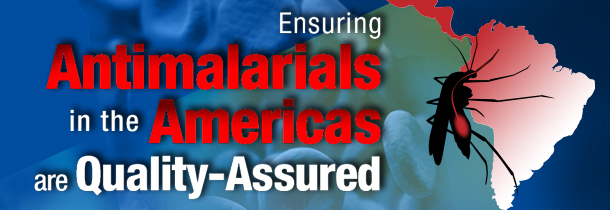
Invest in the Future. Help Ensure Antimalarials Available Are Quality-Assured. Defeat Malaria.
During the past decade, investments in malaria prevention and control have saved hundreds of thousands of lives. A major scale-up of vector control interventions and increased access to diagnostic testing and quality-assured treatments account for most of this progress.
But these gains are fragile, and we must keep malaria prevention, control, and elimination high on political agendas to sustain them. An estimated 3.2 billion people—almost half of the world’s population—are at risk of malaria, according to the World Health Organization. In 2013, 198 million new cases were reported, and 584,000 of those people died.
The threat of malaria also exists in the Americas, but the situation in this region is much better in comparison to other regions in the world. Currently, 14 of the 21 endemic countries in the Americas have indicated commitments toward malaria elimination. They need continued support to sustain their momentum and progress in order to reach this goal.
Strengthening health systems’ quality assurance and quality control capabilities and increasing the availability of quality-assured medicines are crucial to sustaining these gains.
If we cannot ensure the quality, safety and benefit of the tools we have to defeat malaria, including bed nets, oral prophylaxes, diagnostic tests, and antimalarial medicines, then we risk losing gains made, wasting valuable resources and investments, and stymieing progress toward elimination.
To secure the malaria gains of the past and propel those of the future, we need to shepherd our resources toward developing sustainable and resilient health systems that can ensure pharmaceutical quality, as well as the quality of other health commodities needed to defeat malaria.
By helping countries of the Americas strengthen their health systems, including mechanisms for pharmaceutical quality assurance and quality control, and to establish regulatory systems, we not only protect the quality, safety and effectiveness of essential tools, but we also safeguard resources and investments, and the precious opportunities we have to prevent, detect, treat, and defeat malaria.
Poor quality antimalarials are a threat to malaria patients in the Americas and likely exacerbate problems with drug resistance, in individuals and in the population.
Given the danger presented by the spread of substandard and falsified medicines through distribution channels of countries in the world, in general, and in the Americas, in particular, there is an urgent need for measures to control their proliferation and sustainably alleviate the burden and threats they pose to patients and national health systems.
We applaud and are proud to collaborate with the many organizations working globally, regionally, nationally, and locally—on-the-ground, at the frontlines, alongside national governments, collaborating with partners, and the communities we intend to assist—to help develop sustainable systems and processes that increase the availability of quality-assured medicines, and detect and remove the poor quality ones from distribution channels.
PQM helps country partners build capacity of systems and processes that are needed to defeat malaria.
The Promoting the Quality of Medicines (PQM) program helps partners in Latin America and the Caribbean (LAC) region build their capacity to sustain processes that help ensure the quality, safety and effectiveness of antimalarials, and other medicines. Ensuring good-quality antimalarials are available to people of the Americas requires strong national health systems that can sustain robust and integrated regulatory, quality assurance, and quality control processes.
To achieve this, PQM collaborates with Ministries of Health in the region to help them create environments and systems that enable key players and institutions to sustainably execute the essential processes and functions that are required to ensure the quality, safety and effectiveness of antimalarials used in public health programs and interventions as well as those medicines sold on the private market.
PQM has done this in the LAC region in three complementary ways:
- Strengthening the Official Medicines Control Laboratory (OMCL) by providing guidance on quality management systems, training in pharmacopeial techniques, and the provision of analytical supplies and equipment;
- Improving regulatory processes by assisting in implementing a decentralized methodology to monitor and control the quality of medicines in the field, under the conditions in which they are stored and distributed in endemic areas, through the use of field screening methodologies, mostly Minilabs® produced by Global Pharma Health Fund (GPHF); and
- Raising awareness about the issue of antimalarial medicine quality by publishing results in scientific peer reviewed journals, documenting shortcomings in quality assurance systems, and encouraging stakeholders to act and invest in developing and institutionalizing long-lasting, sustainable solutions.
Successes and remaining challenges
Malaria is a priority health challenge that the PQM program is committed to addressing. PQM currently works in seven countries in the LAC region. Some of this work is performed through the Amazon Malaria Initiative (AMI), in conjunction with its partners—Pan American Health Organization, U.S. Centers for Disease Control and Prevention, Management Sciences for Health, and Links Media.
PQM measures its success, in part, through the achievements of its country partners. When our partners reach major milestones that show their capabilities have increased, it’s a good indicator of the success of the PQM program interventions. Several of our partners now have capabilities to monitor the quality of medicines on the market, test their quality to international standards, and function within well-established regulatory systems. Additional information on these successes is available on PQM’s website.
But, more work remains to be done in the Americas. Sustaining the gains of the past is going to be a challenge in the face of declining funding to the region. As countries move toward institutionalizing the tools and approaches introduced by PQM, they must also have capacity to sustain them.
Continued investment and support in this region is essential to ensuring that the country-owned processes and solutions they’ve adopted and institutionalized through PQM’s and other global development partners’ support are sustained.
The Amazon Malaria Initiative (AMI) is an eleven country regional program in the Amazon basin and Central America with support from the U.S. Agency for International Development. AMI was launched in 2001 with the overall goal of preventing and controlling malaria in the Amazon basin. For more information, visit AMI’s website.
The Promoting the Quality of Medicines program is a 10-year cooperative agreement between the United States Agency for International Development and the United States Pharmacopeial Convention. PQM aims to build local capacity by strengthening country quality assurance/quality control systems to ensure the quality, safety and benefit of their medicines. For more information, visit PQM’s website, or contact Victor Pribluda, Ph.D., LAC Regional Manager, at vsp@usp.org.


